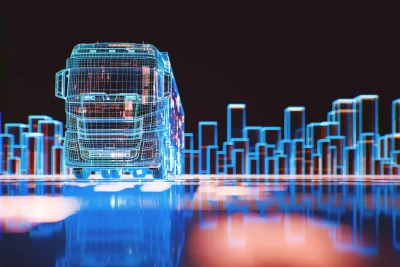Customization vs. Convenience: Tech Adoption in Transport
May 7, 2024
 Freight transportation is constantly evolving. Staying ahead means embracing technological advancements that reshape operations and enhance efficiency. In this tech arms race, one trend gaining traction is the shift from monolithic technology solutions to a modular approach, offering tailored services to meet specific needs.
Freight transportation is constantly evolving. Staying ahead means embracing technological advancements that reshape operations and enhance efficiency. In this tech arms race, one trend gaining traction is the shift from monolithic technology solutions to a modular approach, offering tailored services to meet specific needs.
Traditionally, acquiring technology involved investing in all-encompassing systems, often leading to inefficiencies and rigid structures. However, trends in the transport tech space are evolving. Today, we see a shift in which technology components are disaggregated. This enables the assembly of customized solutions aligning precisely with the consumer’s requirements.
“You used to buy technology in a monolith,” says Andy Tomka, VP of Product at MVMNT. “Now, a lot of technology, whether it’s an AI service, parts of a TMS, or a rating engine, they’re starting to be broken out into individual services that can be put together in service of what you want.”
The incorporation of AI in tech solutions is emblematic of this shift. Rather than a standalone entity, AI now integrates seamlessly into existing frameworks, augmenting capabilities without overshadowing human involvement. It acts as a tool, processing vast data through transaction layers to generate actionable insights. For instance, AI can swiftly identify available capacity in specific markets, empowering brokers to make informed decisions efficiently.
When it comes to tech adoption, when are custom-built options superior to an off-the-shelf solution? Watch the latest episode of the Stay In Your Lane Podcast for key insights on this topic.
But amidst this technological evolution, the human element remains indispensable. While automation streamlines processes, personal connections and trust remain paramount in the transport field. Customers seek assurance beyond automated responses; they crave the reliability of human interaction, especially in critical scenarios like urgent deliveries or unforeseen challenges.
Embracing technology requires strategic navigation, particularly concerning software adoption. The decision between building in-house solutions or procuring existing ones necessitates careful consideration. While customization offers benefits, it demands substantial investment and expertise. On the other hand, leveraging off-the-shelf solutions provides immediate access to advanced tools, accelerating operational enhancements.
 “When you’re thinking of build vs buy, even if you’re building, you still need to have a vision,” says Glenn Koepke, VP of Enterprise Accounts at Vector. “If you’re going to buy, you’d better have a vision, otherwise you’re going to buy something and sit on it for ten years.”
“When you’re thinking of build vs buy, even if you’re building, you still need to have a vision,” says Glenn Koepke, VP of Enterprise Accounts at Vector. “If you’re going to buy, you’d better have a vision, otherwise you’re going to buy something and sit on it for ten years.”
In navigating this terrain, identifying internal champions becomes pivotal. These advocates drive adoption within the organization, ensuring a smoother transition and maximizing the technology’s potential. Likewise, acknowledging and addressing resistance early mitigates potential challenges, fostering a collaborative approach towards technological integration.
“Identify who your champions are going to be with a tech adoption, and who is on the fence with it,” offers Tomka. “Those champions are going to be critical people to lead you into whatever the opportunity is.”
Maintaining objectivity amidst biases is also imperative. Evaluating solutions based on merit rather than preconceptions enhances decision-making and fosters innovation. Considering the end-user experience is equally crucial, as custom-built solutions may lack scalability and compatibility, hindering long-term viability.
Ultimately, the journey towards technological advancement in the freight industry demands a balanced approach. Embracing innovation while preserving core values ensures sustained growth and relevance in a rapidly evolving landscape. By leveraging modular technology, fostering internal alignment, and embracing change, stakeholders can navigate the complexities of the digital age while staying true to a customer-first philosophy.
Even with recent technological innovations, the preference for personalized service persists. Shippers rely on brokers for dedicated support and reliability when an urgent need arises, which occurs often in the transportation industry. This is what sets the 3PL services of Triple T Transport apart from digital broker platforms. The shipper’s solution must be a mix of technology and tribal wisdom through industry experience and partnership.














